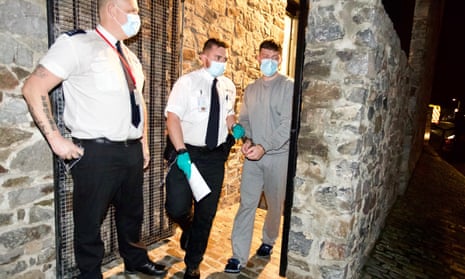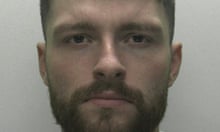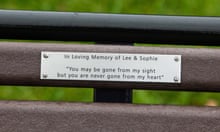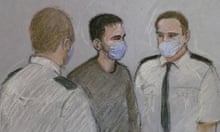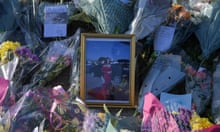In the early evening of Saturday 20 November last year, 18-year-old Bobbi-Anne McLeod told her father, Adrian, she loved him and left the family home in Plymouth to catch a bus, planning to meet her boyfriend.
She was running late because she hadn’t been able to find her trainers and at the bus stop she sent friends an image of her feet to friends via Snapchat, complaining that she was feeling cold.
McLeod was 1.57 metres (5ft 2in) tall, slightly built and could easily have been mistaken for someone several years her junior. Even if she had spotted Cody Ackland sneak up behind her as she waited at the bus stop, she probably would not have stood much of a chance against his savage attack.
Ackland was strong, determined and organised. In the months, possibly years, leading up to this point he had researched the techniques and tactics used by the American serial killer Ted Bundy, whose modus operandi was to approach a victim in a public place, render her unconscious and take her to a second place before killing her.
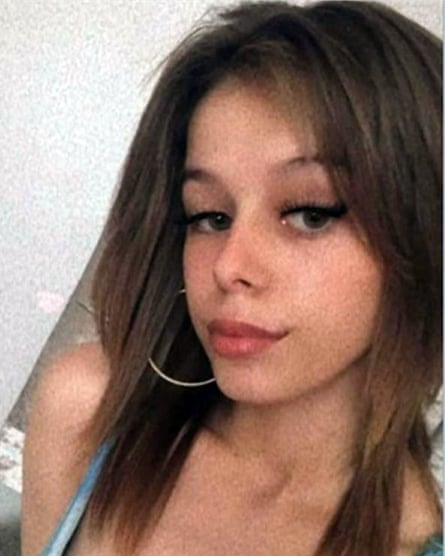
Ackland, 24, struck McLeod on the head with a claw hammer he had brought along just for this purpose. Their eyes, he has claimed, briefly met and the teenager fell to the ground.
He bundled McLeod into the footwell of his car and travelled 19 miles to a car park at a forest on Dartmoor. There he carried out a frenzied hammer attack on McLeod, causing “catastrophic” injuries. Police cannot be sure but they believe she died there.
Ackland began to try to cover his tracks. He burned her handbag, put McLeod’s body in his boot and drove 28 miles to a wooded lane leading to Bovisand beach in south Devon, a place he knew because he partied there. In May last year – six months before the attack – Ackland posted a picture of a roaring driftwood fire on the beach with the caption: “Capture them moments.” He stripped McLeod, removed most of her jewellery and dumped the body 5 metres (15ft) down a steep bank before driving home and going to bed.
McLeod’s boyfriend had raised the alarm. Her mobile phone and AirPods were found near the bus stop and friends, family and police began to search for her.
On Sunday 21 November Ackland drove to a village outside Plymouth where he threw the hammer into a river and hid a carrier bag containing bloodstained clothing in allotments.
Later that Sunday, he went into Plymouth, had a pizza, rehearsed with his indie rock band, Rakuda – he was the songwriter and guitarist – and drank into the early hours of Monday 22 November at a lock-in.
Bizarrely, friends reported he seemed “happier than usual”. He was usually seen as dour and serious, but this night he was chatting, laughing and hugging friends, as excited as he was on band gig nights.
Next day he had what he described as a “chill day”, going to a cinema to see the sci-fi film Dune and sending a picture to friends of him eating a hotdog.
On the afternoon of Tuesday 23 November Ackland suddenly left his workplace, a car valet business. He sent messages to friends, family and bandmates telling them he loved them, walked into Charles Cross police station, Plymouth, and told staff: “I did it. I’m responsible.” He asked for a map and pointed to the spot where he had left McLeod’s body.
During extraordinary interviews, Ackland told police he had a tendency to “overthink” things. On the evening of the murder he said he was feeling “wound up” and “needed to get out”. He claimed he had come across McLeod, whom he did not know, by chance. He insisted his motive was not sexual, though he did say she looked like girls he had dated and was getting over a break-up. He claimed he had stripped her so that she would be harder to identify if found.
Ackland claimed that after the initial attack he thought about taking her to hospital but decided he needed to kill her and described his method as workmanlike, “industrial”. He showed little emotion when being interviewed, only once welling up briefly.
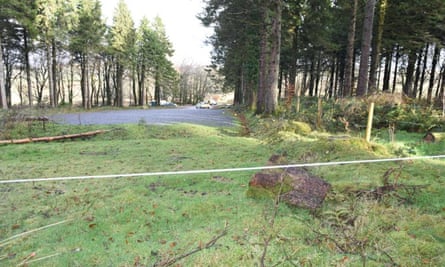
Detectives were shocked not just by the brutality of the crime but by Ackland’s apparently blameless background. He had never been in trouble with the police and was considered by most who knew him as clever and thoughtful. He lived quietly with his mother.
But when they examined his phone, detectives found he had been living a double life. He had a “morbid” interest in serial killers, including Fred West, and was particularly fascinated by Bundy, who killed at least 30 young women and girls in the 1970s. Images of Bundy and the weapons he used were among 3,000 disturbing images including dismembered bodies, postmortems and murder scenes Ackland had collected.
In the days before the murder, Ackland had researched possible sites on Dartmoor where a body could be disposed of, and searched for hammers, crowbars, cutting tools, baseball bats, ski masks, balaclavas and waterproof clothing.
When he was interviewed, Ackland told police killing had not been on his mind because it was “so out there” but he said it had been relatively easy because it felt like a film or fantasy or as if someone else had committed the crime.
He was not in contact with mental health authorities as an adult but he complained to police that he had suffered during his childhood, always getting the “dirty end of the stick”. His father, David, a former soldier and stunt driver, and mother, Helen, split up when he was a child.
Psychiatrists examined him in prison and he told them that from the age of nine he felt “worthless” and had contemplated suicide. He felt he lacked a male role model, was bullied at school and had ADHD. He grew up despising himself and hating the world.
But the experts who spoke to him found no mental illness that would allow him to plead diminished responsibility in court. He had no choice but to plead guilty to murder.
